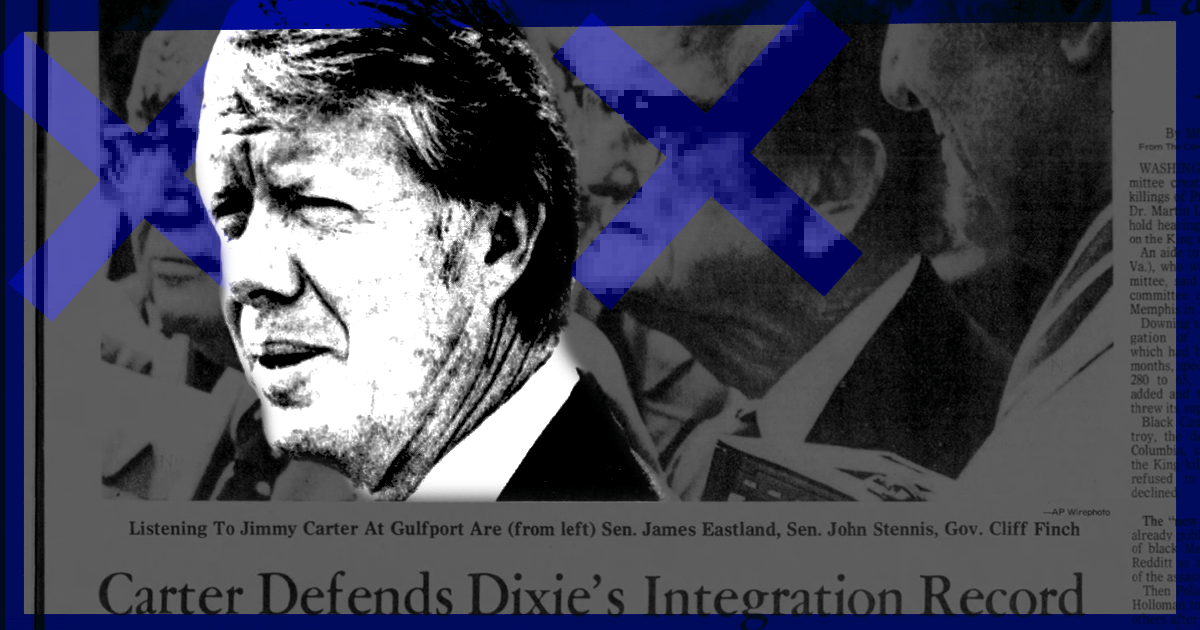
Heather Cox Richardson has an impeccable academic pedigree: Phillips Exeter Academy, Harvard BA, MA, and Ph.D., MIT professor of History, University of Massachusetts Amherst professor, and now a professor at Boston College. In her enormously popular newsletter, Letters From an American, published on June 22nd she evoked the 60th anniversary of the horrific murder of three civil rights workers in Mississippi. Naturally, as is the tradition since 1980, she uses it to bludgeon her political adversaries.
Like a previous analysis, we will focus only on one aspect of her recent post for brevity. Heather Cox Richardson writes:
On June 19, Republican Everett Dirksen (R-IL), the Senate minority leader, managed to deliver enough Republican votes to Majority Leader Mike Mansfield (D-MT) to break the filibuster. The Senate passed the bill and sent their version back to the House. Johnson used the popular rage over the three missing voting rights workers to pressure the House to pass the bill, and it did.
Johnson signed the Civil Rights Act of 1964 into law on July 2.
Heather Cox Richardson suggests that the Republican Party was the major hurdle in passing the 1964 Civil Rights Act. She later insinuates a connection between Barry Goldwater’s RNC speech and the then-missing civil rights workers, implying some Republican link. This amateurish innuendo ignores the fact that Democrats controlled the House and Senate. The real connection between the civil rights workers and a political party at the time was not with the Republicans.
Republican support for the bill was, of course, stronger than that of Democrats, as was the case with previous civil rights legislation of the time:
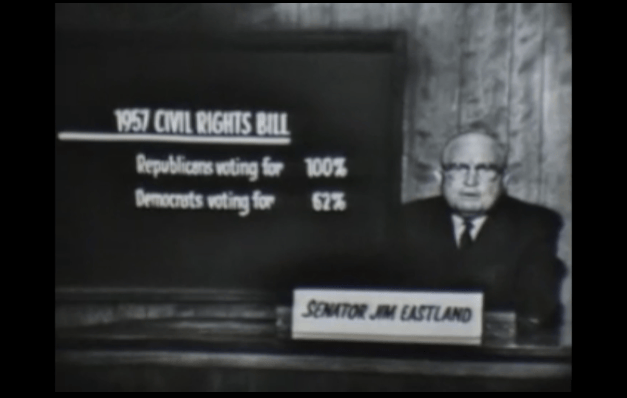
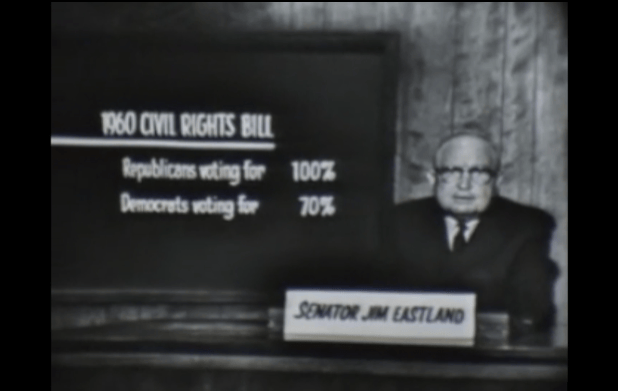
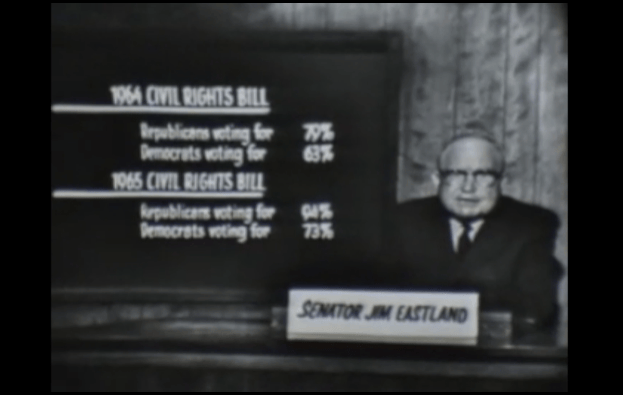
Republican support for civil rights was used for years against Republicans in the South as you can see from these images taken from a 1966 campaign advertisement for Democrat Senator James Eastland running for re-election in Mississippi.
In 1959, Eastland, one of the most notorious segregationist senators in history, was working with Lyndon Johnson to create a bill that would give the South dozens of new segregationist judge appointments to preside over civil rights cases.1 According to Lawrence Walsh, Deputy Attorney General under Eisenhower, Eisenhower blocked the deal that would have given segregationists authority over southern judges. Without the South controlling these judicial appointments, LBJ refused to support the bill and killed it.2
Once the Republicans left the White House and fellow Democrat John Kennedy was elected—owing many favors to Southern surrogates after their support during his 1960 election—Eastland saw a new opportunity to achieve his goals.3 JFK and his brother, Robert Kennedy, also his attorney general, proposed a bill that would give them 73 new federal judge appointments, in addition to the 22 vacancies, for a total of 95 appointments.4
Kennedy appointed swaths of judges who were openly opposed to the Brown v. Board of Education decision. This included judges like William Cox, whom the Eisenhower administration had specifically denied due to his white supremacist views.5
This was a significant setback for civil rights, particularly in Mississippi. Segregationist court decisions not only halted progress but also had a profound cultural impact, turning the tide against civil rights advances. As author Nick Bryant put it, “While Eisenhower’s appointments had encouraged blacks to believe the federal courts were firmly on their side, Kennedy’s candidates had the opposite effect. Throughout the fifties, most blacks believed they could settle their grievances through the courts. By the mid-sixties, the streets had replaced the courts.”6
This can be seen by the escalation of violence, mobs, riots, and of course murders in the South during the 1960s.
One such troublesome authority figure was Judge William Cox. His jurisdiction was the Southern District of Mississippi, where the three civil rights workers were murdered. Judge Cox was from the same Sunflower County as Sen. Eastland. They were close friends and even law school roommates:7
As chairman of the Senate Judiciary Committee, Eastland had the power to thwart the administration on numerous other matters—including the appointment of NAACP counsel Thurgood Marshall to the U.S. Court of Appeals for the Second Circuit—were he not properly appeased. Eastland bargained shamelessly for his friend and former University of Mississippi Law School roommate, reputedly confiding to Bobby Kennedy, “Tell your brother that if he will give me Harold Cox I will give him the nigger.”
Eastland himself questioned the reality of the murders on the Senate floor in July 1964, when the Civil Rights workers were still missing.8
Robert Kennedy would later remark about the Mississippi murders and how the powerful influence of politicians, specifically Sen. Eastland, “created the climate that made these kinds of actions possible… they are the ones who have the major responsibility…”9
The judge who presided over the conspiracy case against the murderers of the civil rights workers: Judge William Cox. Judge Cox initially dismissed the indictments of 17 of the 18 accused in the case, before being overturned by the Supreme Court.1011
When the trial finally resumed in 1967 the judge was again William Cox, and after the verdicts in December 1967, Judge Cox imposed his sentences later saying, "They killed one nigger, one Jew, and a white man--I gave them all what I thought they deserved."12
Sen. Eastland became known as the "Voice of the White South," after gaining power in the Senate Judiciary Committee and becoming its chair in 1956. Eastland led the Committee that became known as the “graveyard of civil rights legislation.” Eastland, the lifelong Democrat, blocked over a hundred civil rights measures during his career from 1943 until 1978.13
Sen. Eastland’s shameful impact on civil rights in America was not his only accolade, another one is his being instrumental in electing Jimmy Carter in 1976.
Mississippi was the state that gave Carter the edge in the tight 1976 election with Gerold Ford.14

The Yazoo Herald, 03 Nov 1976.

The Delta Democrat-Times, 03 Nov 1976
While on a call with the Mississippi Governor, Carter was given the news and exclaimed, “Mississippi put me across!”15 His nomination was sealed. Carter narrowly carried Mississippi by roughly 10,000 votes. Carter’s most prominent Mississippi surrogate and campaigner: Sen. James Eastland.
Carter praised integration by 1976 yet never acknowledged his past support of segregation. Carter was nevertheless able to connect with any segregationist voter still voting based on its nostalgia. Eastland’s senatorial partner-in-crime was John Stennis, another life-long Democrat, and during a 1976 Carter campaign event reassured Mississippi Democrats alongside Eastland, “Let me just say one thing about this integration, I’m still against it, always have been and always will be, but it’s a fact.”16 Eastland was asked about Carter’s previous comments supporting integration, he begrudgingly said “We are supporting this man for President.”17
Local papers thought it was a clear attempt by Carter to bolster his Southern credentials.18 After all, for the former segregationist voter in Mississippi, why would you not listen to the Voice of the White South?

The Sun Herald, 18 Sep 1976.
The Democratic Party did not shy away from this Southern Strategy. Full-page advertisements in Mississippi papers featured Stennis and Eastland with the headline “Which Side Is Your Bread Buttered On??? […] Jimmy Carter, Democrat, Will Give You Traditional Democratic Relief.”19

The Clarion-Ledger, 01 Nov 1976.
Stennis and Eastland were doing Carter campaign appearances right up until the election:
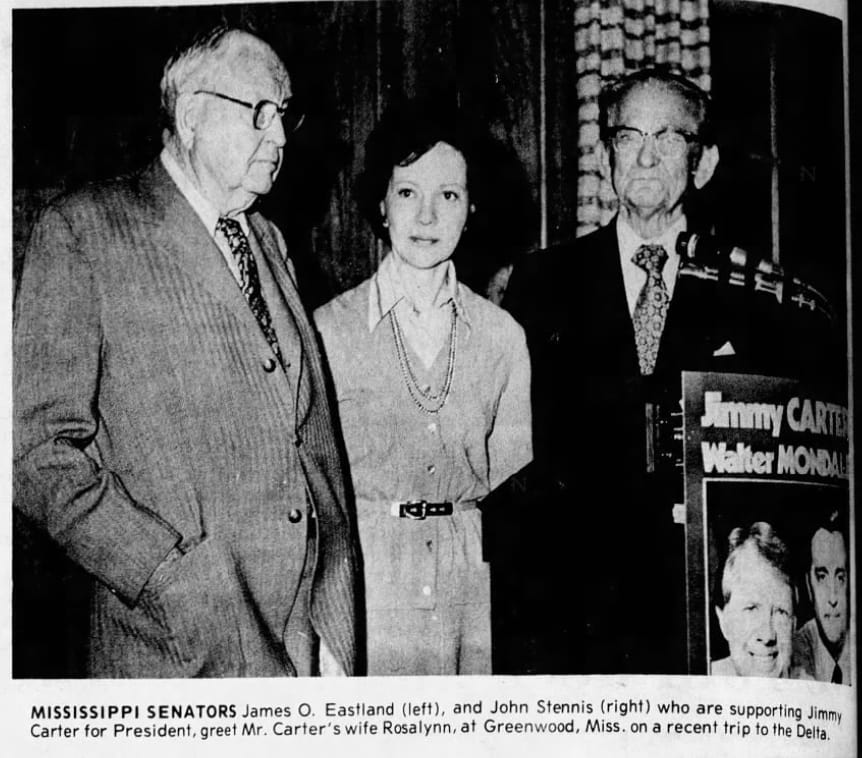
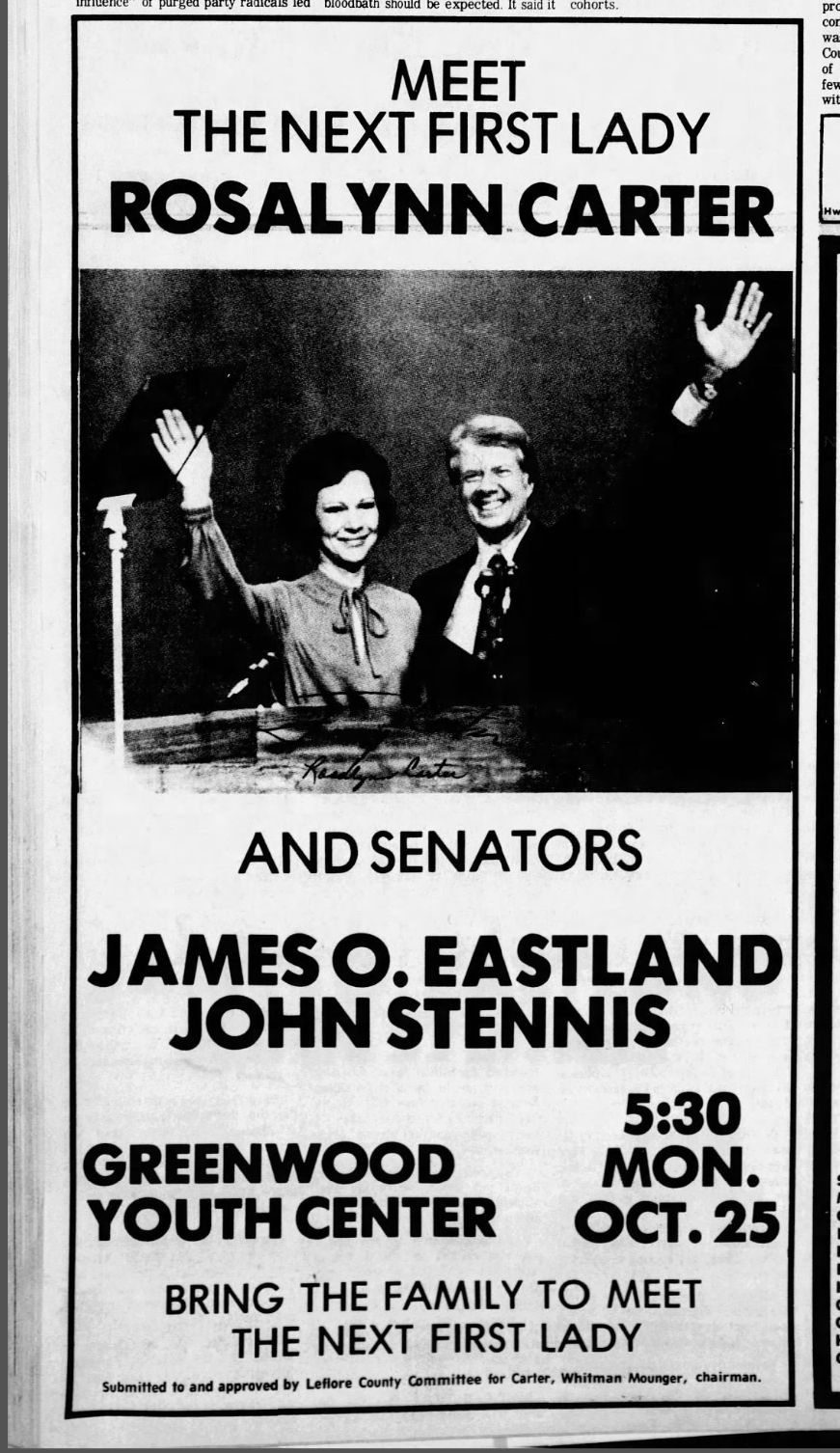
Mississippi advertisements for Carter featured Stennis with the headline “THE SOUTH IS RISING WITH JIMMY CARTER.”20

Simpson County News, 28 Oct 1976.

The Magee Courier, 28 Oct 1976.
Carter’s victory included Sunflower County, home of William Cox and James Eastland.21

The Enterprise-Tocsin, 04 Nov 1976.
Throughout our study of Jimmy Carter, we have noticed, for better or worse, a recurring character trait: personal loyalty. An example of this can be seen when Carter sat the recently retired James Eastland beside him on stage during Carter’s 1980 re-election campaign launch in Alabama even featuring him in TV advertisements:
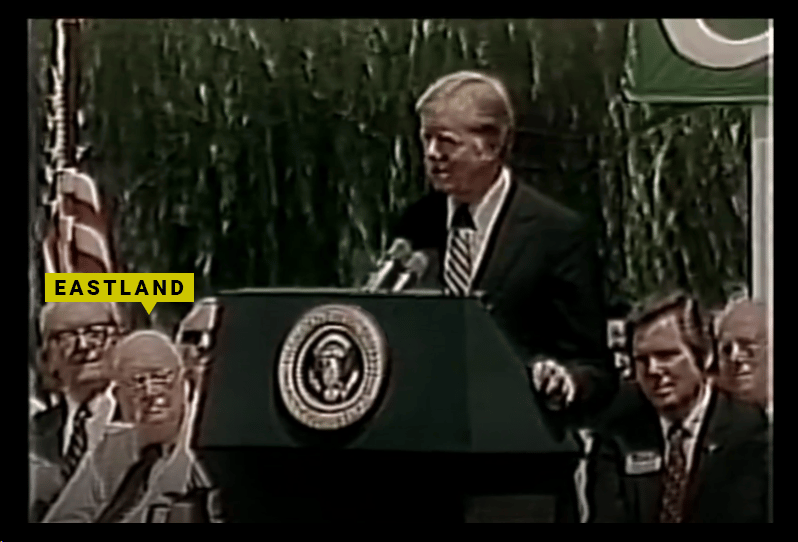
1980 Jimmy Carter Campaign Television Advertisement "Southern 5", Congressional Archives Carl Albert Center. [Name added]
While Heather Cox Richardson and her cohort paint the horrific murders into their low-resolution images of history to further a partisan myth, they ignore true accountability and historical clarity. They falsely associate Goldwater’s RNC speech with some sort of tacit endorsement of racial violence when it was the opposite. They endlessly and embarrassingly try to tie the Mississippi murders to Reagan’s Neshoba speech mention of “states’ rights” while ignoring the rest of his campaign and the clear context of what he said states had a right to do: administer more effective help to its citizens. They focus on such flimsy examples yet ignore the overwhelming evidence like the Democratic Party’s creation of the conditions for the explosion of racial strife and continued use of the most prominent Southern segregationist surrogates throughout the 1970s.
It’s no wonder why so many Americans believe the Party Switch Myth. If you’re interested in uncovering the truth, join us and follow along by subscribing.
The culmination of our research and analysis can be found in the upcoming book Dismantled: The Party Switch Myth. Available.

Required Reading:
David A. Nichols, A Matter of Justice. Simon & Schuster, 2007.
Irwin F. Gellman, Campaign of the Century: Kennedy, Nixon, and the Election of 1960. Yale University Press, 2021.
1 Walsh, Lawrence E. The Gift of Insecurity: A Lawyer’s Life. ABA, 2003, p. 176-77, confirmed in an interview with David Nichols, 01 Sep 2006.
2 Nichols, David A. A Matter of Justice. Simon & Schuster, 2007.
3 Gellman, Irwin F. Campaign of the Century: Kennedy, Nixon, and the Election of 1960. Yale University Press, 2021.
4 New York Times, 20 May 1961; Matter of Justice, p. 267.
5 Branch, Taylor. Parting the Waters: America in the King Years, 1954-63. Simon & Schuster, 1988, p. 700.
6 Bryant, Nick. The Bystander: John F. Kennedy and the Struggle for Black Equality. Basic, 2006, pp. 286-88.
7 Cagin, Seth, and Dray, Philip. We are Not Afraid: The Story of Goodman, Schwerner, and Chaney and the Civil Rights Campaign for Mississippi. Macmillan Publishing Company, 1988, p. 372.
8 We are Not Afraid, p. 412.
9 We are Not Afraid, p. 393.
10 New York Times, 25 Feb 1965.
11 United States v. Price et al. 383 U.S. 787. US Supreme Court. 1967.
12 The Clarion-Ledger, 24 Jul 1983.
13 Mississippi Encyclopedia. "James Oliver Eastland." Accessed June 24, 2024. https://mississippiencyclopedia.org/entries/james-oliver-eastland/
14 The Yazoo Herald, 03 Nov 1976; The Delta Democrat-Times, 03 Nov 1976.
15 The Hattiesburg American, 04 Nov 1976.
16 The New York Times, 18 Sep 1976.
17 Chicago Tribune, 18 Sep 1976.
18 The Sun Herald, 18 Sep 1976.
19 The Clarion-Ledger, 01 Nov 1976.
20 Simpson County News, 28 Oct 1976; The Magee Courier, 28 Oct 1976.
21 The Enterprise-Tocsin, 04 Nov 1976.

